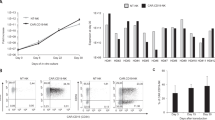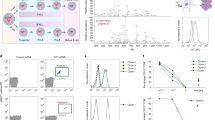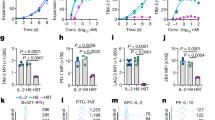Abstract
The prolonged in vivo survival of genetically modified effector cells is crucial to the success of any (gene-modified) adoptive cellular immunotherapy approach. In cancer clinical trials to date, however, the detection of surviving circulating gene-modified T cells has required highly sensitive techniques. In vitro studies of T cell co-stimulation have shown that up-regulation of the anti-apoptosis gene Bcl-XL by ligation of CD28 promotes T cell survival, but not proliferation. Here we have investigated the ability to modulate resistance to apoptosis and improve cell survival by transducing human peripheral blood lymphocytes using a retroviral vector that expresses Bcl-XL. We show that Jurkat cells transduced with Bcl-XL retrovirus were partially resistant to Fas (CD95) antibody-induced apoptosis. Subsequent in vitro assays with transduced primary human lymphocytes demonstrates that over-expression of Bcl-XL promotes the survival of lymphocytes cultured in the absence of interleukin-2. Activation-induced apoptosis with anti-CD3ɛ antibody, OKT3 is also modulated. Furthermore, Bcl-XL over-expression in human lymphocytes delays the onset of apoptosis induced by long-term co-culture with tumour cell lines. Despite this improved in vitro survival, in a preliminary experiment to assess safety, no signs of malignancy or autoimmunity were observed in NOD/SCID mice injected with Bcl-XL transduced lymphocytes. These results indicate that expression of Bcl-XL in lymphocyte therapy either alone or in conjunction with an additional therapeutic gene could enhance persistence of cells in vivo thereby potentially improving the clinical outcome of adoptive cellular therapy.
This is a preview of subscription content, access via your institution
Access options
Subscribe to this journal
Receive 12 print issues and online access
$259.00 per year
only $21.58 per issue
Buy this article
- Purchase on Springer Link
- Instant access to full article PDF
Prices may be subject to local taxes which are calculated during checkout





Similar content being viewed by others
References
Rosenberg S.A. et al. Gene transfer into humans – immunotherapy of patients with advanced melanoma, using tumor-infiltrating lymphocytes modified by retroviral gene transduction N Engl J Med 1990 323: 570 570
Mitsuyasu R.T. et al. Prolonged survival and tissue trafficking following adoptive transfer of CD4zeta gene-modified autologous CD4(+) and CD8(+) T cells in human immunodeficiency virus-infected subjects Blood 2000 96: 785 785
Riddell S.R. et al. T-cell mediated rejection of gene-modified HIV-specific cytotoxic T lymphocytes in HIV-infected patients Nat Med 1996 2: 216 216
June C.H., Bluestone J.A., Nadler L.M., Thompson C.B. . The B7 and CD28 receptor families Immunol Today 1994 15: 321 321
Radvanyi L.G. et al. CD28 costimulation inhibits TCR-induced apoptosis during a primary T cell response J Immunol 1996 156: 1788 1788
Sperling A.I. et al. CD28/B7 interactions deliver a unique signal to naive T cells that regulates cell survival but not early proliferation J Immunol 1996 157: 3909 3909
Fraser J.D., Irving B.A., Crabtree G.R., Weiss A. . Regulation of interleukin-2 gene enhancer activity by the T cell accessory molecule CD28 Science 1991 251: 313 313
Boise L.H. et al. CD28 costimulation can promote T cell survival by enhancing the expression of Bcl-XL Immunity 1996 3: 87 87
Boise L.H. et al. bcl-x, a bcl-2-related gene that functions as a dominant regulator of apoptotic cell death Cell 1993 74: 597 597
Dahl A.M. et al. Expression of bcl-x(L) restores cell survival, but not proliferation off effector differentiation, in CD28-deficient T lymphocytes J Exp Med 2000 191: 2031 2031
Groux H. et al. CD3-mediated apoptosis of human medullary thymocytes and activated peripheral T cells: respective roles of interleukin-1, interleukin-2, interferon-gamma and accessory cells Eur J Immunol 1993 23: 1623 1623
Groux H. et al. CD3-mediated apoptosis of human medullary thymocytes and activated peripheral T cells: respective roles of interleukin-1, interleukin-2, interferon-gamma and accessory cells Rosenberg SA et al. Experience with the use of high-dose interleukin-2 in the treatment of 652 cancer patients. Ann Surg 1989; 210: 474–484; discussion 484–485
Krammer P.H. . CD95’s deadly mission in the immune system Nature 2000 407: 789 789
Rosenberg S.A., Spiess P., Lafreniere R. . A new approach to the adoptive immunotherapy of cancer with tumor-infiltrating lymphocytes Science 1986 233: 1318 1318
Liu K., Rosenberg S.A. . Transduction of an IL-2 gene into human melanoma-reactive lymphocytes results in their continued growth in the absence of exogenous IL-2 and maintenance of specific antitumor activity J Immunol 2001 167: 6356 6356
Schmidt-Wolf I.G. et al. Phase I clinical study applying autologous immunological effector cells transfected with the interleukin-2 gene in patients with metastatic renal cancer, colorectal cancer and lymphoma Br J Cancer 1999 81: 1009 1009
Hahne M. et al. Melanoma cell expression of Fas(Apo-1/CD95) ligand: implications for tumor immune escape (see comments) Science 1996 274: 1363 1363
Huang D.C. et al. Activation of Fas by FasL induces apoptosis by a mechanism that cannot be blocked by Bcl-2 or Bcl-x(L) Proc Natl Acad Sci USA 1999 96: 14871 14871
Pirtskhalaishvili G. et al. Transduction of dendritic cells with Bcl-xL increases their resistance to prostate cancer-induced apoptosis and antitumor effect in mice J Immunol 2000 165: 1956 1956
Gross G., Waks T., Eshhar Z. . Expression of immunoglobulin-T-cell receptor chimeric molecules as functional receptors with antibody-type specificity Proc Natl Acad Sci USA 1989 86: 10024 10024
Finer M.H. et al. kat: a high-efficiency retroviral transduction system for primary human T lymphocytes Blood 1994 83: 43 43
Hawkins R.E., Russell S.J., Winter G. . Selection of phage antibodies by binding affinity. Mimicking affinity maturation J Mol Biol 1992 226: 889 889
DuBridge R.B. et al. Analysis of mutation in human cells by using an Epstein-Barr virus shuttle system Mol Cell Biol 1987 7: 379 379
Costello E. et al. Gene transfer into stimulated and unstimulated T lymphocytes by HIV-1-derived lentiviral vectors Gene Therapy 2000 7: 596 596
Acknowledgements
Cancer Research UK funds DE, DEG and AON. We thank Mike Hughes and Jeff Barry (Paterson Institute for Cancer Research, Manchester, UK) for their assistance with flow cytometric analysis. This work was also supported by EU Framework Programme V-QLK3-1999-0162.
Author information
Authors and Affiliations
Rights and permissions
About this article
Cite this article
Eaton, D., Gilham, D., O'Neill, A. et al. Retroviral transduction of human peripheral blood lymphocytes with bcl-xL promotes in vitro lymphocyte survival in pro-apoptotic conditions. Gene Ther 9, 527–535 (2002). https://doi.org/10.1038/sj.gt.3301685
Received:
Accepted:
Published:
Issue Date:
DOI: https://doi.org/10.1038/sj.gt.3301685
Keywords
This article is cited by
-
Tumor-Infiltrating Lymphocyte Therapy for Melanoma: Rationale and Issues for Further Clinical Development
BioDrugs (2014)
-
Gene-engineered T cells for cancer therapy
Nature Reviews Cancer (2013)
-
Adoptive T-cell Immunotherapy of Cancer Using Chimeric Antigen Receptor-Grafted T Cells
Archivum Immunologiae et Therapiae Experimentalis (2010)
-
Immunotherapeutic strategies employing RNA interference technology for the control of cancers
Journal of Biomedical Science (2007)
-
Supernatural T cells: genetic modification of T cells for cancer therapy
Nature Reviews Immunology (2005)



